[ad_1]
Alpha Phi Alpha, the first intercollegiate Greek-letter fraternity established for African-American men, was founded on December 4, 1906 at Cornell University in Ithaca, New York. Initially serving as a support group for minority students who faced racial prejudice on campus, the organization eventually evolved into a frat based on the principles of scholarship, fellowship, good character and the uplifting of humanity, according to its official website.
Although it includes prominent members from a number of industries, the fraternity is known for producing some of America’s greatest civic and government leaders. Check out six Alpha Phi Alpha members who have made and/or continue to make a difference in the world around us.
W. E. B. Du Bois
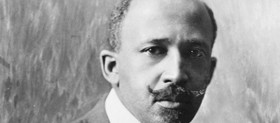
Du Bois joined the Epsilon chapter of Alpha Phi Alpha at the University of Michigan in 1909 as an honorary member. The same year, the author played an instrumental role in establishing the National Association for the Advancement of Colored People.
The civil rights activist, sociologist and writer was the first African-American to earn a Ph.D from Harvard University and wrote many important works detailing the Black experience, including The Souls of Black Folk and Black Reconstruction.
Thurgood Marshall
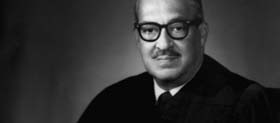
Marshall was initiated into the fraternity during his sophomore year at Lincoln University in Pennsylvania. As a young member, he embraced the practical jokes and hazing often associated with Greek life, including shaving other student’s heads against their will and using paddles to hit pledges, a move that almost got him expelled from the organization.
With time comes maturity. Marshall went on to argue and win the 1954 landmark Supreme Court case Brown v. Board of Education of Topeka, which mandated the desegregation of schools across the nation. In 1967, he became the first African-American U.S. Supreme Court justice.
Adam Clayton Powell Jr.
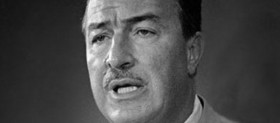
After joining a White frat in college, the future minister and politician joined Alpha Phi Alpha while attending graduate school at New York’s Columbia University, according to African American Fraternities and Sororities: The Legacy and the Vision by Tamara L. Brown.
Powell went on to become a major activist, fighting for employment opportunities and fair housing within his Harlem neighborhood. Running as a Democrat, he was elected to the House of Representatives in 1944, becoming the first Black congressman from the state of New York.
Martin Luther King Jr.
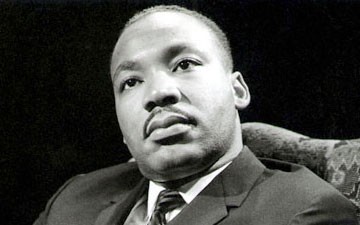
King became a member of Alpha Phi Alpha Fraternity, Inc. in 1952. He joined the Sigma chapter as a young graduate student at Boston University, where he was working on his doctorate. Four years later, he was given the Alpha Award of Honor for ‘‘Christian leadership in the cause of first-class citizenship for all mankind’’ during the fraternity’s 50th-anniversary convention.
He went on to become the most monumental figure of the civil rights movement, organizing the 1955-1956 Montgomery Bus Boycott and the 1963 March on Washington, where King delivered his famous “I Have a Dream” speech.
Dick Gregory
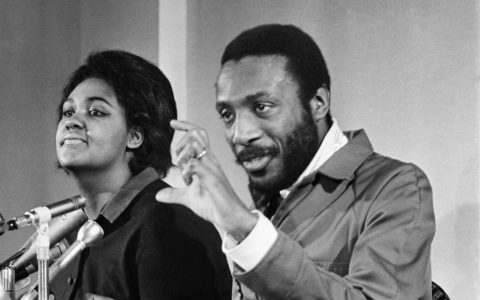
The comedian and activist was initiated into the Beta Eta chapter of Αlpha Phi Alpha in 1954 while attending Southern Illinois University. In addition to his brand of political comedy, which has influenced stand-ups such as Chris Rock and D.L. Hughley, he was at the forefront of the Civil Rights Movement alongside fraternity brother Martin Luther King Jr.
“What black folks are given in the U.S. on the installment plan, as in civil-rights bills. Not to be confused with human rights, which are the dignity, stature, humanity, respect, and freedom belonging to all people by right of their birth.” —Dick Gregory
Cornel West
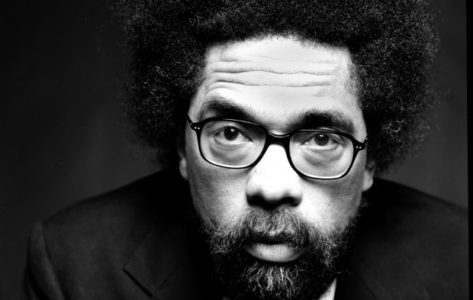
Although little is known about West’s initiation into the fraternity, the professor and activist proudly stated his admiration for Alpha Phi Alpha during a 2010 interview with Golden Sky Media.
“When you’ve got Paul Robeson, W.E.B. Du Bois, Martin Luther King Jr., Duke Ellington, Jesse Owens, Adam Clayton Powell III, that are all a part of that fraternity? You’ve got nations that don’t have that kind of high-quality leadership. . . . Of course, theb Kappas and Omegas are doing their thing, but Alphas are Alphas!”
And speaking of Alpha men being Alphas and doing their thing, watch the Alpha Rho Chapter of Alpha Phi Alpha show why they were No. 1 at the FVSU 2019 stepping show below:
[ad_2]
Source link

